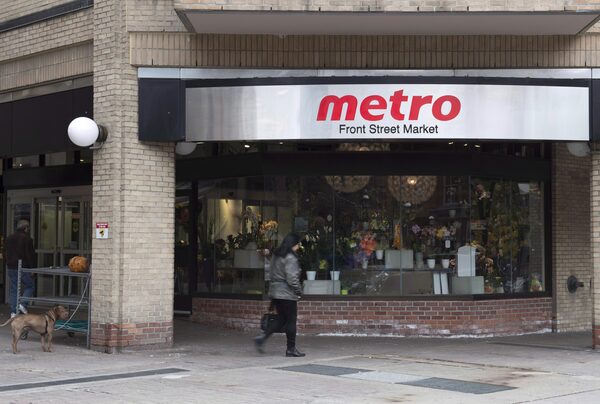
A woman walks pass a Metro grocery store in Toronto on Nov. 1, 2017. Metro operates most of its food and pharmacy stores in Canada’s two largest provinces along with some Jean Coutu locations in New Brunswick.Doug Ives/The Canadian Press
Metro Inc. plans to roughly double the number stores with self-checkouts during its 2020 fiscal year as the industry contends with a tight labour market.
“It’s a challenge,” chief executive Eric La Flèche said during a conference call with analysts after the company released its fourth-quarter results.
“I suspect it’s a challenge for everybody in retail and it’s a challenge for us to staff stores.”
In October, the unemployment rate in Quebec was 5 per cent and 5.3 per cent in Ontario, according to Statistics Canada. Both fell below the national rate of 5.5 per cent.
Metro operates most of its food and pharmacy stores in Canada’s two largest provinces along with some Jean Coutu locations in New Brunswick.
Mr. La Flèche said the company is managing through the problem so far, but he said at a certain point, if staff don’t show up or stores can’t find people to fill vacancies, store conditions start to reflect that reality.
“That’s why technology, like self-checkout or shelf labels, helps in making the job simpler for our store people,” he said.
More than 100 Metro stores already have self-checkouts installed, and the company plans to add the technology to another 100 locations this fiscal year, he said.
Currently, 37 stores have electronic shelf labels that don’t require price tags to be updated manually, he said, and Metro is targeting to boost that number to close to 100 by the end of its 2020 financial year.
While the company is installing the self-checkouts in an effort to improve customer experience, Mr. La Flèche said the technology and electronic shelf labels help manage labour costs.
“If we manage our hours well ... we’re seeing some labour savings as expected to provide the return on investments.”
Labour savings vary by store, he added.
The comments came as the retailer ended its fiscal year with a 15.4-per-cent net earnings boost in the fourth quarter.
The Montreal-based company earned $167.4-million, or 66 cents a diluted share, for the period ended Sept. 28, up from 56 cents a share, or $145-million a year earlier.
Excluding one-time items, Metro earned $174-million, or 68 cents a share, in adjusted profits, compared with $161-million, or 63 cents a share, a year ago.
Revenue increased 3.3 per cent to $3.86-billion from $3.74 billion as food same-store sales climbed 4.1 per cent, and pharmacy same-store sales were up 3.4 per cent.
Metro was expected to report 69 cents a share in adjusted profits on $3.85-billion of revenue, according to financial markets data firm Refinitiv.
For the full year, net earnings fell by more than half to $714.4-million from $1.72-billion after the sale of operations. Adjusted profits grew 26.3 per cent to $731.6-million, or $2.84 a share. That compared with $579.2-million, or $2.41 a share, in the 2018 fiscal year.
Revenue was $16.77-billion, up 16.6 per cent from $14.38-billion, or up 3.2 per cent when excluding the Jean Coutu Group.
Your time is valuable. Have the Top Business Headlines newsletter conveniently delivered to your inbox in the morning or evening. Sign up today.